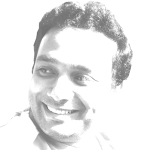Are holding hands, hugging or kissing objectionable? What about teen sex in schools? What's the limit? What is good and what's bad? Holding hands and hugging may pass the censor board, but kissing? Well, may get a nod with some cuts. And teen sex in school? Are you crazy? Don't you have any sense? What will become of our country if we allow such things to pollute the young minds of our kids? The schools have every right to protect kids from obscenities and hence, take actions against such acts which may have perverse effects on other kids.
Now there are barrage of fuzzy things. Has there been any scientific survey done by any credible agency to prove that teen sex is actually a social menace? On the contrary I know my grandmother (and may be most of others too) had teen sex. I can't say that my grandmother's all the six children had any perverse influence in their lives because their mother had teen sex. Rabindranath's wife had teen sex. So did Mahatha Gandhi's wife. So did most women in India till some time back.
I didn't have teen sex. Does that mean that I've imbibed something more positive than my grandmother. I don't think so. So in the absence of any modern day survey and based on the historical data I have, I can't say teen sex is a menace.
Well, now you can say my grandmother was married. So the question is not about teen sex being bad, but whether pre-marital sex is. Again, in the absence of any survey on what basis would I believe that? Who came up with this verdict?
Most of our mythological heroes or Gods had premarital sex. How was Karna born? Is Kunti a fallen woman - she actually had teen pre marital sex. What about Vidyapati's depiction of Krishna's love for Radha something which we worship?
So neither teen sex nor pre marital sex can be condemned, without any data. And so this very argument that teen sex in schools is bad falls flat. So what are we talking about? We are actually talking about something which I find has no basis, at least in Indian context, again, in the absence of any data corroborating such claims.
Obscenity is a very fragile concept, at least for a country like India where there are lots of dichotomy. When we say, O Goddess of learning, Thy breasts adorned with pearls, (kucha yuga shobhita muktaa haare) I bow to Thee in obeisance, there's no problem. But then depicting Saraswati, the Goddess of learning, in such a way, showing her bare breasts adorned only in pearls, would be objectionable.
We don't mind rubbing our hands symbolically, dipped in milk, on a quite authentic symbol of a phallus, inserted into the vagina of a woman, (and seen from the top from within the woman's vagina). A little thought will tell us the symbolism of the milk. Very logically young women doing this act publicly is meant to get them good (productive) husbands. Nothing of this is objectionable to anyone.
So what is objectionable? Who decides? What is right and what is wrong?
My friend Atanu puts is very well. "The deep and unsettling sexual hypocrisy", he sayd, "is embedded in Indian mindset, and in our institutions, in our families and in the society at large. The rapid progress in the external liberalization of life and its pleasures has not at all been matched by a deeper introspection of our own psychology, or opening up of what is essentially a regressive, prejudiced culture (rich in content, lacking in dynamism or evolution). This is not a question of right or wrong, but acceptance of behavioral diversity. We still think the best way of raising children is to straighten them into these rigid frames of "culturally safe" archetypes."
There's a serious dichotomy in our society. In a school program boys and girls dancing to "Chikni Chameli" is fine, but then hugging and kissing become such a great issue. All so called popular kids' cartoons always have some level of PDA and those are rampantly viewed by all kids. We're absolutely fine with that. Yes, they are actually fine as there's some innocence in it and the same needs to be retained among the kids. But then, you can't allow certain degree of something somewhere and then demonize something else somewhere in the name of good moralities and culture.
We're absolutely fine taking our kids to movies where sexually explicit scenes are rampant and then we complain when a boy and girl getting "objectionably" close in the the bus, thinking it will impact our kids adversely.
Hypocrisy and dichotomy is what I would call Talibanism. And it's not that just because one unfortunate young life is lost that I'm calling the system Taliban, it's because of the inherent hypocrisies we already have. Ours is a society with dismal regards for women and girls. We don't allow women to enter into some temples and we are bothered about the perverse impact of kids hugging and kissing in schools.
What's needed is not the change in the mindset of just the schools, but also in us, who all constitute the society.









